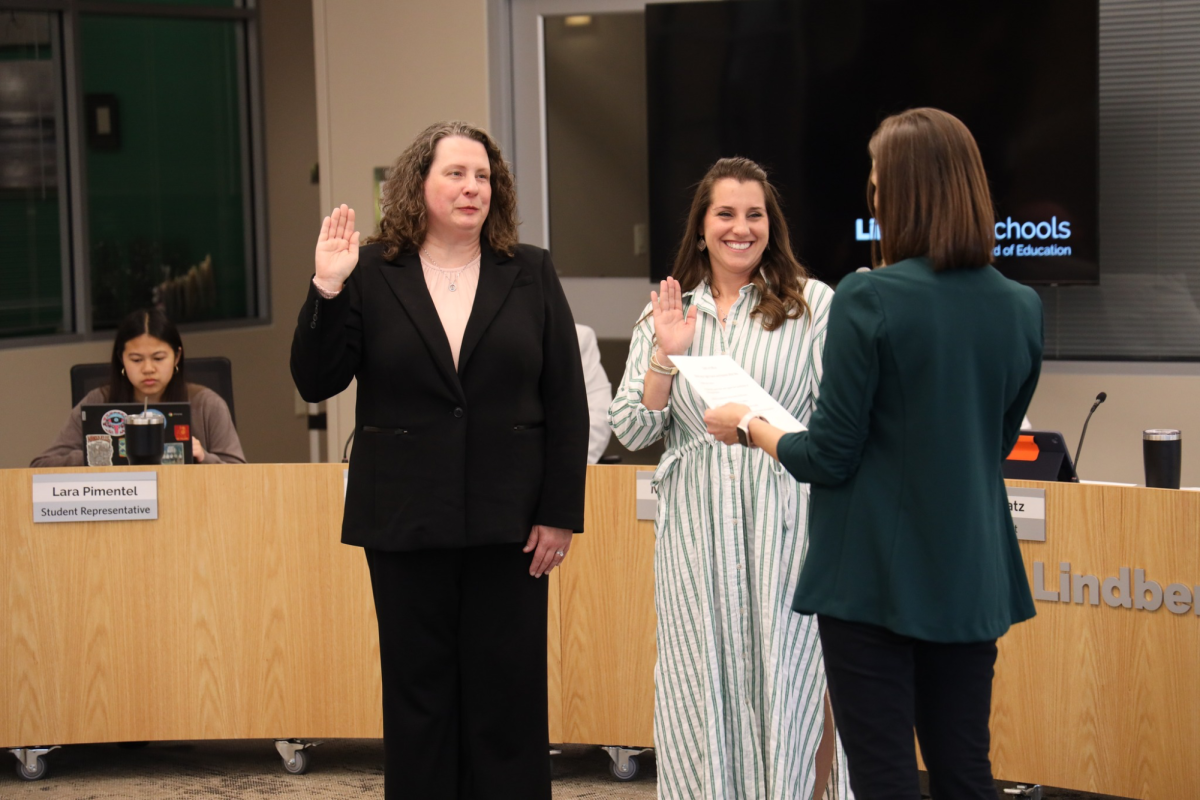The results of a recent telephone survey of Lindbergh Schools residents were scheduled to be further discussed by the Board of Education during a budget workshop earlier this week.
The board’s budget workshop was scheduled Tuesday night — after the Call went to press.
The telephone survey was conducted during April by Patron In-sight of Stilwell, Kan. The results were presented to the school board last week by by Ken DeSieghardt of Patron Insight. A total of 400 registered voters in the district were interviewed for the survey, which carries a margin of error of plus or minus 5 percent.
Fifty-eight percent of respondents to the survey said they would support a tax-rate increase that would cost the owner of a $200,000 home $95 per year. Forty-eight percent of survey respondents said they would support a tax-rate increase that would cost the owner of $200,000 home $152 per year while 43 percent of survey respondents said they would support a tax-rate increase that would cost that same homeowner $209 per year.
Chief Financial Officer Pat Lanane said May 11 the $95 per year increase would equal a 25-cent tax-rate increase, the $152 per year increase would equal a 40-cent tax-rate increase and the $209 per year increase would equal a 55-cent tax-rate increase. Previous amounts he had told the board and press were incorrect, he said.
He asked DeSieghardt, “… The question I would have on that, though, is what about numbers in between those? In other words, we saw some — a lot of support actually — at the 25 cents and not so heavy on the 40 (cents). What if we looked at a number in between there? What would be your guess might happen?”
DeSieghardt replied, “… That’s why it’s important to look at these as examples, I think, as a snapshot of current opinion. Right now at the $95 level as of April 2010, you’re somewhere between 53 and 63 percent support. No matter when you run the election, there’s time between now and then to either make the case for a little bit more or this amount or whatever the case may be … It would appear to be a modest amount, at this point, of some wiggle room.
“That doesn’t mean that you can’t build more wiggle room as you go forward, but as it stands right now the numbers suggest that the current patron mood is that or perhaps a little bit more,” he added.
In March, board members voted unanimously to give final approval to more than $4.7 million in reductions for the 2010-2011 school year. The board’s action eliminated 60 positions, including 45 teaching positions. But even with the $4.7 million in reductions, the district still faces a roughly $3.9 million budget shortfall next year.
The district’s long-range financial plan calls for a spend down of its $24.6 million in reserves with a deficit-spending cap of $3 million per year. In June, the school board adopted a 2009-2010 operating budget that projected a deficit of $3 million. That $3 million deficit was reached by making more than $2 million in reductions for the current school year. But a further decline in the assessed value of commercial real estate — including successful appeals by commercial property owners to the county Board of Equalization — increased the projected budget deficit for the current school year to more than $5 million.
Officials plan to further utilize district reserves to cover the increased deficit, and projections indicate those reserves will drop to roughly $19 million at the end of the current school year. If reserves fall below roughly $13 million, the district would have to borrow money to operate.
Simpson told the Call a 25-cent tax-rate increase would generate roughly $3 million.
“… Let’s say we passed 25 cents today. We’re still in the red,” he said. “It would be a hollow victory because it would not bring the district back to financial health. As a matter of fact, we’d have to do further cuts. With a 25-cent levy, we would have to cut further even after the victory of the levy and cut just to balance (the budget) …”
Noting Patron Insight’s numbers “are usually pretty accurate,” Simpson said he was pleased with the support for a 25-cent tax-rate increase.
“… We are proud of that. We are. It’s like penicillin, though. It’s not enough to cure the patient …,” he said. “… The board is going to have an extremely hard decision. The 25-cent levy is not really an option in any way that I can see. Like I said, it’s a hollow victory. You’ll pass the levy and make additional cuts immediately afterwards, and that is not what a tax increase is supposed to be …”
Even a 40-cent tax-rate increase would not be enough to restore the district to financial health, Simpson said.
“It’s more in the 60- to 70-cent range … Financial health to me is you pull yourself out of the red and you balance and you have a modest amount of money that you can give cost-of-living raises in the foreseeable future for your staff. And you have a modest — a very modest amount of money — that you can put back in your savings because we’ve been burning through our savings like nobody’s business,” he said.
“This district has been a Fort Knox of solid financial stewardship, but we are burning through our savings alarmingly and we need to have even a little bit of money to start building those reserves back up and try to get healthy again. I say this with the idea that we don’t want to go back to the voters. We’re the people that don’t ask you for much in terms of taxes. It’s decades before we practically ask you. Some districts come every two or three years and say: Well, we need another 10 cents. Need another 15 cents. And that’s their strategy. But our strategy is we get healthy. We get our financial house solid, our foundation solid and then we’re good for another decade or two. And that’s Lindbergh … If somebody said: Well, what is that number? We’re going to need about $4 million, $4.5 million in new revenue just to where we break even because we’re up to $3.9 million now. There will be further cuts coming in the next 24 months, everybody realizes that, from the state and the federal government …”
Determining how much of a tax-rate increase to seek will be difficult, he said.
“… The only real victory is going to be a tax levy that’s large enough to get us out of the red ink and get us to where we can bring back a few of the things that we know we need and can’t get by without,” Simpson said. “We’ve cut so deep that we’re just making do in so many areas waiting for better times ourselves — and so bring back some essential student programs that work with students and student achievement, get us out of the red ink and give us a little bit of extra that we can do cost-of-living raises. People say: Well, it’s a recession. What about these raises? I don’t think you ever should give another raise.
“Well, you need to think that through because that’s another way of saying: I think all teachers should go somewhere else and work. We have the best teachers in the state. We have trained them to high levels of instructional excellence. That’s one of the main reasons we have the best test scores. That’s one reason that we get so many awards. But we’re going to lose those teachers when neighboring districts are going to pay them $4,000 and $5,000 more to come there. And I would say that’s not a futuristic thing. That’s happening as we speak. We are losing teachers right now in Lindbergh because neighboring districts will give them $4,000, $5,000, $6,000 more a year to do the same job.
“And if we don’t stay in the game and at least somehow stay in the pack with these cost-of-living raises, that will accelerate to where actually Lindbergh becomes the training ground for other districts … We’ve worked for so many years so hard to build a second-to-none school district … It just would be heartbreaking to see it go the other direction and to dismantle it or to cripple it to where so many things that make all those great things occur on a routine basis stop occurring … We’re a little dismayed that our talent is being taken by other districts this year as we speak …,” Simpson said.





















